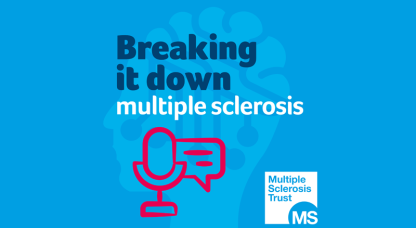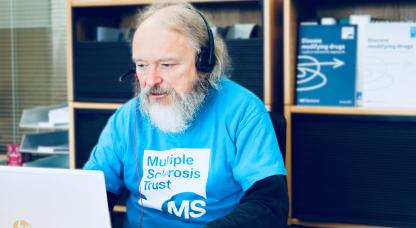Over 4,400 people received a personal, confidential response to their enquiry last year, making 2022 our busiest year ever for the MS Trust helpline. Every year, we look back at your questions to help us plan improvements to our information and support.
People using the helpline include people with all kinds of MS as well as people going through the diagnostic process, friends, family and health and social care professionals. Here are the top five topics that we were asked about last year.
This is the big one. Pain is the most common symptom that we are called or emailed about. It can be distressing to experience and to talk about.
We still hear from people who have been told that there isn’t pain associated with MS, but our experience with the MS community suggests otherwise. People with MS can experience sensory pain, musculoskeletal pain, muscle spasms, burning sensations, to just list a few.
Living with discomfort and pain takes bravery and resilience. It can affect all kinds of other symptoms too, especially mental health. We aim to signpost people to the health professionals and services that can help, but also to help them find solutions for themselves through gentle activity, complementary therapies and other techniques.
Our webpage on Pain has comprehensive information, as well as links to videos, interviews and other organisations that can help with pain management.
The second most common question we are asked comes from people who might be experiencing weird symptoms. They are starting to piece together their personal health history but are not sure what to do next. We can’t offer a diagnosis ourselves of course, but we can talk about what is going to be involved in the diagnostic process. Who to speak to, how long the process might take and what to expect if the enquirer does get a diagnosis of MS.
We often will want to reassure someone that it’s not going to be the end of the world if it is MS. I often say that the best time to get an MS diagnosis is now – we know more than ever about the condition, we have more treatment options, and we have accessible support groups like our Facebook Group and others, that can give you some company on the journey.
Our webpage 'Worried you have MS?' is very popular, and gives an overview of the issues you might be facing.
Getting an MS diagnosis can be devastating, or a relief, or anything in between. People call us with all kinds of questions about their future, their families, work and other plans. They might also want a bit of a road map about what to expect from their MS team, their treatment plan, who will be involved in their care and what they can do for themselves.
We listen carefully to what the caller is telling us, and help them express their concerns and work out a path that suits them. Emotional support is often needed here, as well as a bit of practical ‘what next’ approach.
We've developed lots of useful resources for people who have been newly diagnosed with MS. In our web shop you can order or download our Making Sense of MS series of books and information sheets for free.
Quite a few enquiries we get are about how to get in touch with their local MS specialist nurse. The person enquiring may have moved house, may have lost touch with their MS service, or want to know more about what an MS nurse can do for them. Or an MS Nurse might contact us to find the right services or information for their patients.
We think that specialist MS health professionals of all kinds make a huge difference to the quality of life and quality of healthcare for people with MS, which is why we fundraise to get more of them into the NHS. We know that the existing MS teams out there are stretched thin, and not all of them are able to provide the service that they would want to, so this is why we, as a charity, want to help.
You can use our MS Map of Services to look up the contact details for the MS services near you.
If you're interested in our Health Professionals Programme and how we support and train MS specialist health professionals, you can read more on our website.
These enquiries might be from people who have not had a follow-up in a while and feel forgotten; or they feel that their symptoms are deteriorating but the medical response has not been what they hoped. These enquiries can be tricky.
Health and social care can be somewhat fragmented, and people really need some help to navigate the system to get the support they need. We can talk people through how they might get through the barriers to getting good care in their area and look up contact details for services they need. We can also direct enquirers to advocacy services or organisations such as Healthwatch for specialist help.
In an ideal world, there should be a responsive multi-disciplinary and person-centred approach to each individual with MS. In reality this doesn’t happen for everyone. MS services are still struggling to catch up after the effects of Covid-19, and we know that we need around 50% more MS nurses nationally to serve the existing caseload.
Where there it is clear that there has been a problem, we do encourage people to comment directly to that NHS service by raising a concern through PALS or similar. Expressing a concern does not affect your care, and your MS team may well be just as frustrated as you with the situation. Making a formal complaint means that there will be a process to look at the issue, and that can shine a light and result in improvement for you and other people using that service.
We have online information to support you if you are raising a concern about your healthcare.
If you have a question about MS, call our free helpline on 0800 032 38 39 or email ask@mstrust.org.uk
We're open Monday to Friday (except bank holidays) from 9am-5pm. Outside these hours, you can leave us a message and we'll get back to you as soon as we can.





